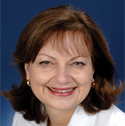During her 16 year tenure as a Liberal MP in the Victorian rural electorate of Murray, Dr Sharman Stone has pursued a number of social, regional and indigenous issues that have helped her win six elections.

A sixth-generation Northern Victorian, Stone was born in 1951 in Pyramid Hill, a town to the west of Echuca within the Murray electorate.
Educated at both Monash and La Trobe universities, Stone obtained degrees in anthropology and sociology as well as a PhD in economics at the University of Melbourne.
As the local Member of Parliament in an electorate in which the numbers of new arrivals have boomed over the last couple of decades, it is easy to understand why she has become a mainstay in the political scene in the Murray region since 1996.
In what was, and still is, a traditionally conservative voting area – the city of Shepparton in particular – Murray has become a model of how multiculturalism can work.
Some would suggest a lot of this could be put down to Stone with her keen interest and work in the areas of immigration and indigenous relations.
During her time in parliament, Sharman was Minister for Workforce Participation and Parliamentary Secretary to the Minister for Finance and Administration in the former Howard Government, and in opposition has been Shadow Minister for Immigration and Citizenship, and before that the Shadow Minister for Environment, Heritage, the Arts and Indigenous Affairs.
As well as the influx of immigrants, the Murray area has a significant indigenous community, with around 5 per cent of the inhabitants of aboriginal heritage. Stone’s concern for the welfare of indigenous people is evident through her time served on the Council for Aboriginal Reconciliation and the House of Representatives Standing Committee on Aboriginal and Torres Strait Islander Affairs.
Sharman also edited Aborigines in White Australia (1974), an indicator of her devotion to the area of indigenous wellbeing.
An Albanian café sits in the middle of Wyndham Street, one of Shepparton’s main stretches of road, and remains one of the more popular lunchtime destinations in the area even for non-Albanians. The café is surrounded by pieces of aboriginal artwork, showing what a multicultural melting pot the region has become.
Debri Kutrolli, a member of Murray’s sizeable Albanian community, arrived in Shepparton in the late 1990s with his extended family and says that he and other immigrants were made to feel at home by the local government, which made settling in a lot easier.
‘Of course, leaving home and moving to the other side of the world was difficult and we had our problems, but we were made very welcome by both the citizens and the local government and due to this we were able to find jobs quite quickly’, he says.
‘They weren’t the most glamorous of jobs. My parents worked in the fruit industry and others we knew made the trip to Seymour everyday to work in the abattoirs, but there was money to be made and food could be put on the table each night, which was all that really mattered.’
Although Kutrolli says the migrant community holds Stone in high regard, he does not agree with the Liberal Party’s asylum seeker policies, especially with regard to the ‘no documentation, no entry’ policy.
‘I understand Sharman and her (Liberal) government’s concern with the so called ‘boat people’ coming to our shores. However, she should remember how desperate these people are. Most of them come from war zones and will do whatever possible for a better life.
‘They will go through whatever means possible, even through the smugglers, to get to Australia and these people need to be taken care of. For example, lately there has been a big increase in African refugees residing in Shepparton. They come from war zones like Congo, and my guess would be they came with barely any papers due to the people smugglers, but they have proven to be genuine hard working citizens, just like us Albanians and the Italians, the Turks and so on.’
‘There shouldn’t be a distinction made between us and them, as we are here for the same reason, a better life.’
However, the people of Murray, whether it be immigrant, non-immigrant, indigenous or non-indigenous have constantly showed their support for Stone through the voting booths, which resulted in a resounding 20.4 per cent margin win in the 2010 election.
It is obvious that Stone is a well-liked character within the Murray electorate, and her sense of community may well be part of her following. As well as her work with marginalised communities, she is Patron of the Goulburn Valley Vietnam Veterans Association, the Shepparton & District National Servicemen’s Association and the Shepparton Relay for Life.
Stone, through her education and political actions, has been able to galvanise a region where newly arrived citizens and locals are able to work together to create a strong, vibrant community abuzz with multicultural undertones – a sight not seen prominently through most regional areas.
Daniel Baricevic is a student at La Trobe University.
To view profiles of some of the other backbenchers as part of upstart’s Backbench Insiders project, click here.






